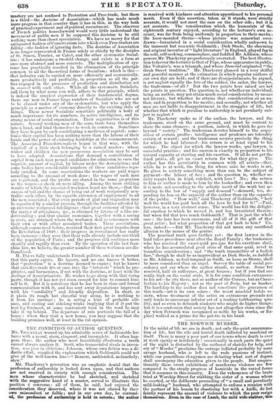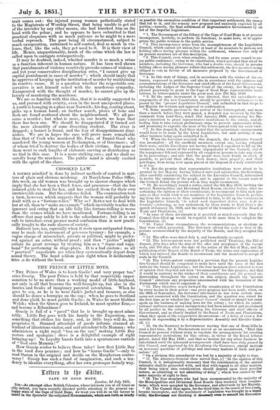THE NORWICH MURDER.
IN the midst of life we are in death ; not only the quiet consumma- tion of life, but the vile and brutal death inflicted by mankind on itself. There is many a poor part of our towns where death is ever at work openly or insidiously : occasionally in such parts the quiet of the night is disturbed by the outburst of shrieks for help, and cry of " Murder " proclaims the outrage inflicted probably by some savage husband, who is left to the rude passions of instinct, while our punctilious clergymen are debating what sort of dogma shall accompany the education given to the people. But unques- tionably these overt exhibitions of murderous violence are few compared to the steady progress of homicide in the varied forms that it assumes in this country. Even the vehemence of the brute tried at Worship Street for stabbing the sister of a woman whom he courted, or the deliberate proceeding of " a small and peculiarly mild-looking" husband, who attempted to enforce a reunion with the partner of his bosom by chastising her with a knife, do but faintly represent the amount of violence to which the poor resign themselves. Even in the case of Lamb, the mild wife-stabber, this
trait comes out : the injured young woman pathetically stated to the Magistrate of Worship Street, that being unable to get rid of the intruder by any other means, she had knocked him on the head with the poker; and he appears to have submitted to that practical eloquence with as much patience as he might to a mere verbal reproach. The poor being ill circumstanced, subject to much exasperation, untrained to self-control, deal so much in vio- lence, that, like the eels, they get used to it. It is their view of life. Hence, unquestionably, much of the crime which the law is called upon to castigate retrospectively. It may be doubted, indeed, whether murder is so much a crime as a function inherent in human nature. It has been well shown that punishments of violence reactively provoke crimes of violence ; and yet your conservative disciplinarian cries, "I cannot give up capital punishment in cases of murder" ; which should imply that he approves of keeping up the institution of murder by maintaining its reactive cause. It is a question whether the respectable con- servative is not himself seized with the murderous sympathy. Exasperated with the thought of murder, he cannot give up the luxury of murdering the murderer. We are so familiar with this idea, that it is readily suggested to us, and pursued -with avidity, even in the most unexpected places. A youth is lounging in a place near Norwich ; his dog, routing about, picks up a human hand; on further search, pieces of bone and flesh are found scattered about the neighbourhood. We all pre- sume a murder ; but what is more, in our hearts we hope that there has been one. We should be disappointed if it turned out the mere absurdity of some dissecting student. The river is dragged; a bonnet is found, and the fear of disappointment dimi- nishes. We are in hopes the case will prove more remarkable than that of Cook who murdered Mr. Peas, of Daniel Good who murdered the young woman at Roehampton, or of Greenacre ; all of whom tried to destroy the bodies of their victims. But none of them went to such lengths of elaborate carving or distribution as we find in this case. It is a more striking case ; and we shall as- suredly hang the murderer. The public mind is already excited with the spirit of the chace.



























 Previous page
Previous page